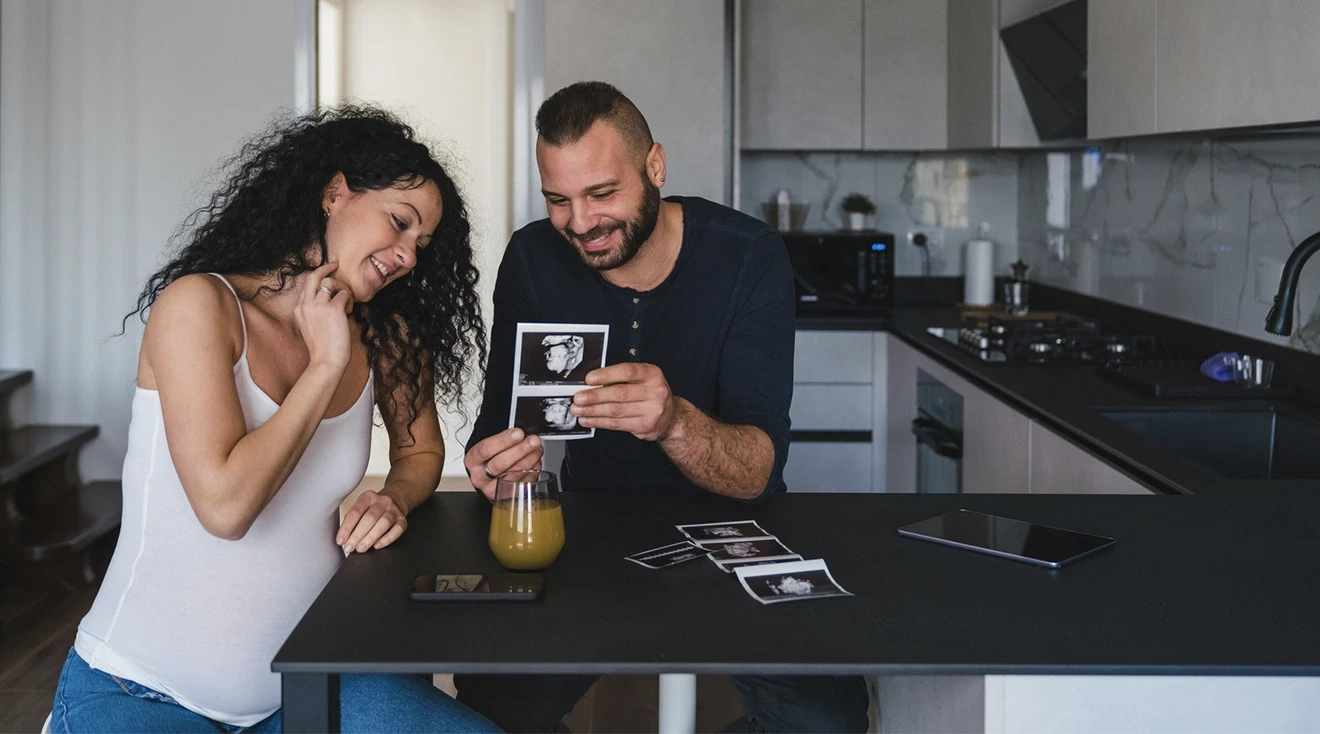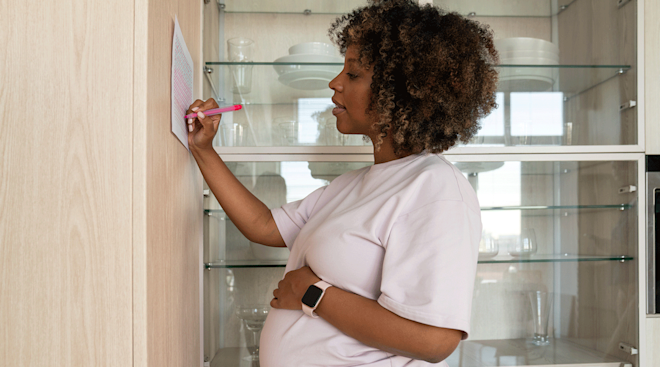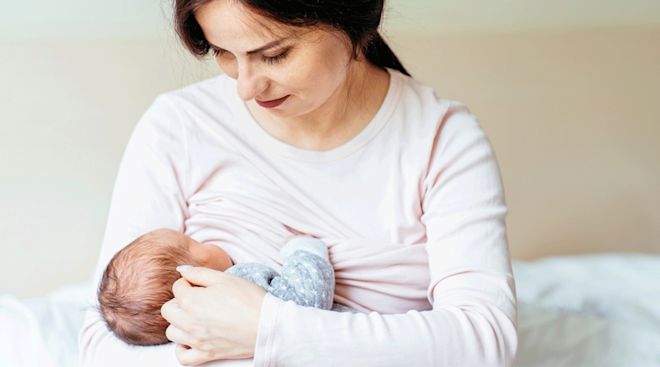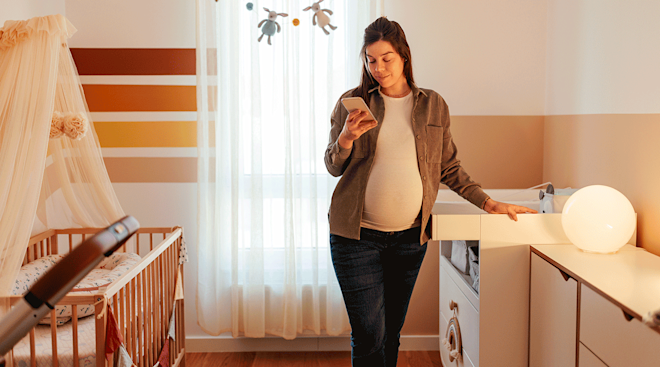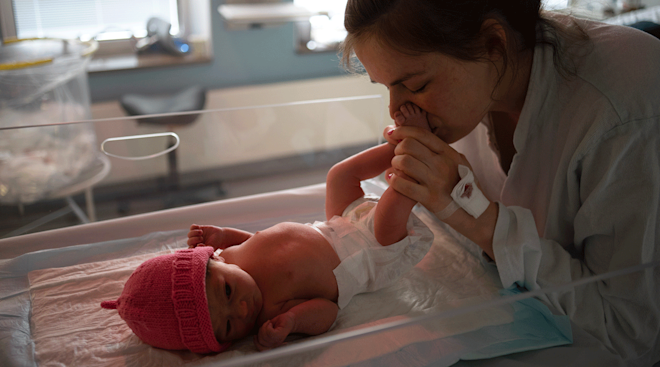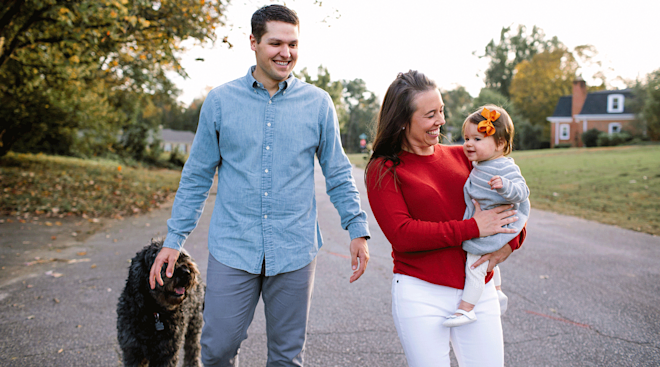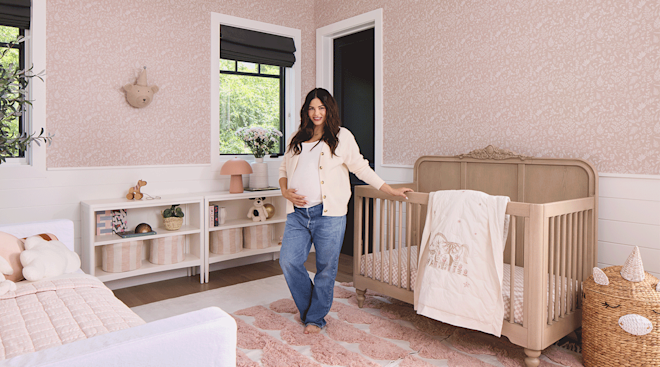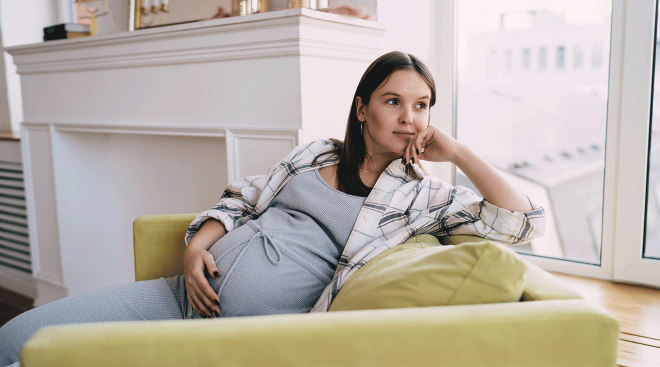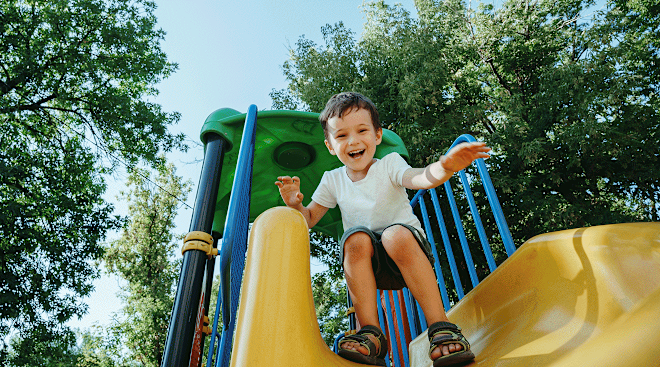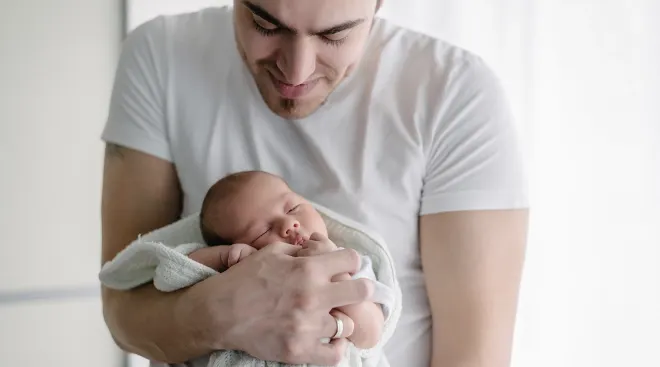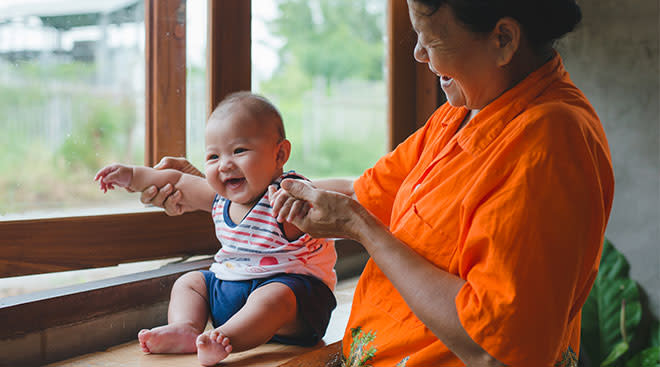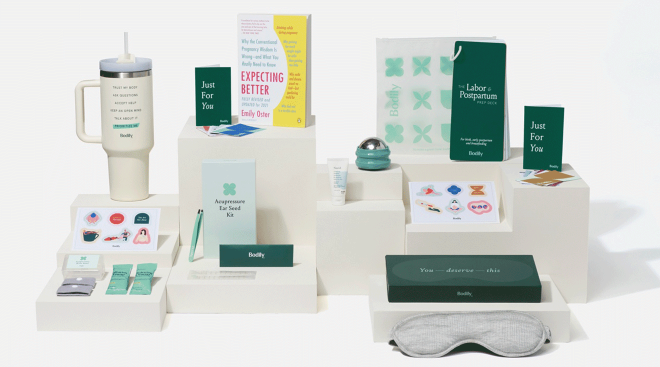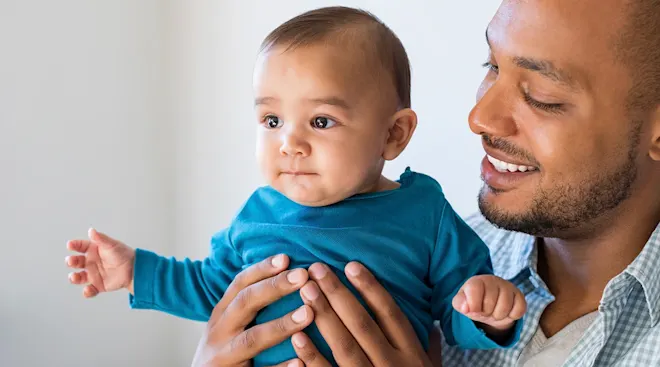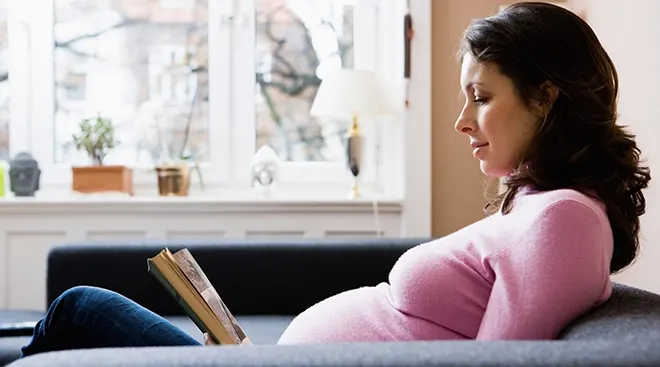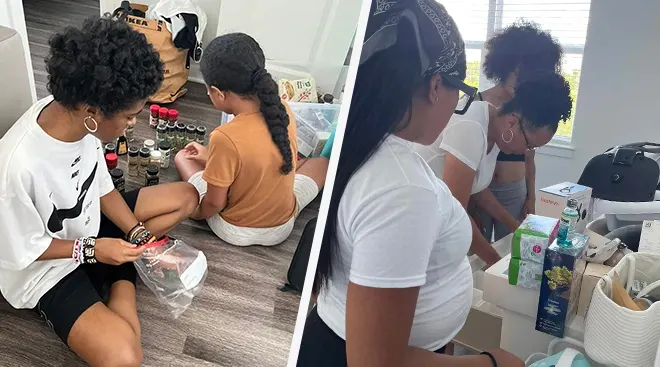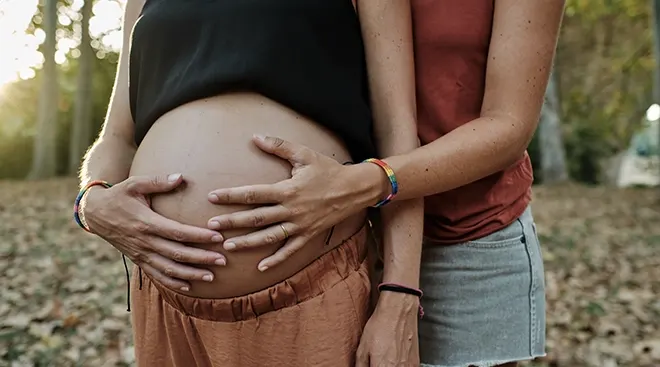Expectant Parents Want to Know: What Will My Baby Look Like?
One of the most common questions among soon-to-be parents: What will my baby look like? It’s normal to be curious. You want to know: Will they inherit your blue eyes? Will they have your partner’s charming dimples? Is it possible to estimate their future height and build? And will you be able to see a resemblance between your daughter and your fabulous late grandmother? (Spoiler alert: It’s very likely!)
How genetics influence baby’s appearance is a complicated matter to say the least. So what does the latest research say about how well we can predict what our babies will look like? We asked the experts to weigh in.
Inquiring minds want to know: What will my future baby look like? Even if you’re not yet pregnant, you may be daydreaming about a hypothetical mini version of yourself or your partner (or maybe a perfect blend of the two of you!).
Baby will have two sets of genomes (one copy of DNA from each biological parent), so there’s a good chance they’ll resemble both sides of the family in some capacity. That said, given the numerous ways genes can influence each other, there’s no definitive way to predict exactly what baby will look like, says Dongyu Jia, an associate professor of biology at Georgia Southern University. “Each chromosome can have hundreds of genes that you inherit from your parents,” he says.
Can a quiz predict what baby will look like?
Don’t be fooled by quizzes or generator apps on your phone that claim to predict what baby will look like after you upload photos or answer questions about you and your partner. Those mishmash images they spit out? They’re fun (and often hilarious), but not based on actual science.
In real life, baby’s appearance isn’t an exact blend of half of each parent. In fact, baby may exhibit traits that neither of you nor your partner have, thanks to genetic variations. “There’s a lot of genetic mixing that goes on in our egg and sperm cells,” says Blair Stevens, a genetic counselor with McGovern Medical School at UTHealth Houston and a prenatal expert at the National Society of Genetic Counselors.
Genetic researchers have figured out different ways to detect variations in our DNA that may indicate, among other things, a person’s susceptibility to certain diseases. And they’ve made major discoveries on which specific genes help determine traits like eye color and hair type. But even if you were able to discover your unborn baby’s primary eye color via genome sequencing, it’s not likely you’d find out the exact shade, says Jia.
Much of what baby will look like comes from the genes passed down from their biological parents. Patterns of inheritance are complex: With all the possible chromosome combinations two parents pass down, they could produce more than 70 trillion unique kids, explains Jia.
Baby’s traits are largely controlled by genes working together, but some are also influenced by environmental factors like nutrition and lifestyle, says Jia. For example, tall parents are likely to have tall children, but height and body type are also impacted by diet. Likewise, sun exposure, which can kickstart genes to turn on and off, may affect hair color and skin tone.
What will baby’s eyes look like?
Researchers used to think that eye color was determined by a single gene and followed a simple inheritance pattern where brown eyes were dominant to blue ones. They’ve figured out though, that the process is more complex, notes Jia. Two major genes and multiple other ones are associated with making and storing a pigment called melanin; people with brown eyes have more melanin in their irises, while people with blue eyes have less.
You can pretty much bet that if you and your partner have similarly colored eyes, your baby will follow suit. Occasionally though, genetic variation causes unexpected results. Although it’s rare, two parents with blue eyes can have a child with brown eyes, and two parents with brown eyes can have a baby with blue eyes. Also, adds Jia, variations in these genes will determine how light, dark and hue-flecked baby’s eye color will be.
What will baby’s hair look like?
Will baby inherit your strawberry tresses? Genetic inheritance strongly affects both hair color and texture. Like with baby’s eyes, their hair color depends on how much melanin is expressed by genes. Most of the people in the world—more than 90 percent, estimates the National Institutes of Health—have black or brown hair, which means they have two copies of the gene that controls which type of melanin is produced. Blond hair, composed of less melanin, is rare. Red hair, primarily made of a different melanin than black, brown or blond hair, is even more rare.
If you and your partner are both brunettes, baby probably will be too. However, if you both have brown hair and you both carry the gene variation for either blond or red, there’s a slim chance baby could end up being a blond or redhead, respectively. The probability of being a blond is pretty high if both parents are blonds; the same goes if you’re both redheads.
Your child’s hair color is also impacted by environmental factors like UV rays or pollution, and may change over time, notes Jia. Research suggests that hair color may also change when kids reach puberty, when hormone levels rise and stimulate genes that cause their hair to change color.
What will baby’s complexion look like?
Baby’s skin color mainly depends on you and your partner’s skin color, the skin color of both of your ancestors and exposure to sunlight, which can trigger genes that darken baby’s skin.
You may want to spend some time looking at pictures of your grandparents and their parents, says Stevens. “Does anyone have lighter and/or darker skin? Looking at your family history and seeing how those [skin tones] have mixed together can give you an idea” of what baby’s complexion will be like, she says.
If your family has a history of only having lighter skin associated with northern European ancestry, and your partner has dark skin linked to cultures that come from near the equator, baby’s complexion will likely be somewhere in the middle. Of course, if one or both biological parents have a family tree dotted with mixed skin tones, your children will probably have light and dark genes in their makeup; one may end up fair-skinned while another exhibits deeper tones, says Stevens.
What about freckles? According to the Genetic Science Learning Center at the University of Utah, freckles show a dominant inheritance pattern, so if you and your partner have them, baby probably will too. Be careful in the sun—freckles tend to grow darker when exposed to UV rays.
What will baby’s height and build be like?
If you and your partner are both statuesque, your child will mostly grow to be tall too. Of course, it’s still normal for tall couples to produce siblings of varying heights. Roughly 80 percent of a child’s height is determined by genetic inheritance, says Jia; the other 20 percent can be attributed to environmental factors like Mom’s pregnancy diet, the child’s nutrition and certain illnesses. While rare genetic variations may cause severe growth disorders or milder effects on height, most children will end up within two inches of their parents’ midparental height, notes the Mayo Clinic. (Calculate this by adding your height and your partner’s height in inches; add 5 inches for boys or subtract 5 inches for girls, then divide by two.)
Geneticists don’t yet know enough about the link between heredity and body type to predict whether baby’s build will eventually look more like yours or your mother-in-law’s. Genetics definitely play a role though: Several studies have found more than 50 genes associated with obesity, although most with small effects. Newer research from the University of Cambridge implies that thinness is also an inheritable trait.
There are even studies suggesting that there’s a genetic link for athletic body types, in which certain genes influence fiber types that make up muscles. That said, you can’t solely blame your DNA if baby doesn’t make it to the NBA. Environmental factors like lifestyle, diet and severe illness may have a substantial impact too, notes Jia.
It’s one of the oldest adages in parenting: Babies look more like their dads. At least two research papers decades ago seemed to back this up, showing that people were better at matching photos of young children with pictures of their dads than with pictures of their moms. More recent research contends that when babies look like their fathers, they’re healthier due to the fact that dads are more likely to spend time and money on kids that show a resemblance to them. This father-child theory makes some sense from a survival-of-the-fittest standpoint; maternity of a baby is, after all, typically ironclad while paternity may be questionable. That said, newer studies have thrown some shade at this conjecture. Another study demonstrated that newborns resemble their moms more in the first few days of life.
Jia chalks some of this up to biased perception. “It’s really hard to say that you look more like the dad or the mom,” he says. “You’re getting equal amounts of genetic information from both parents, and most babies tend to exhibit a similar degree of physical resemblance to both parents.” What’s more, research in Evolution and Human Behavior found that most babies do tend to resemble both their parents to about the same degree.
Genetics certainly play a major role in determining baby’s traits, but there’s much more to the puzzle—and it’s impossible to fully predict all their physical attributes in advance. So what will baby look like? Only time will tell.
Please note: The Bump and the materials and information it contains are not intended to, and do not constitute, medical or other health advice or diagnosis and should not be used as such. You should always consult with a qualified physician or health professional about your specific circumstances.
Plus, more from The Bump:
Dongyu Jia, PhD, is an associate professor of biology at Georgia Southern University. His research focuses on cellular and molecular approaches to understand how signaling networks control proper organismal development. He earned his doctorate degree from Florida State University.
Blair Stevens, CGC, is the director of prenatal genetic counseling services at McGovern Medical School at UTHealth Houston and a prenatal expert at the National Society of Genetic Counselors. She earned her masters degree from the University of Texas Genetic Counseling Program
National Institutes of Health, Is hair color determined by genetics?, July 2022
Journal of Comparative Human Biology, Is increased constitutive skin and hair pigmentation an early sign of puberty?, June 2013
Genetic Science Learning Center at the University of Utah, Observable Human Characteristics
Mayo Clinic, Can a Toddler’s Height Predict Their Adult Height?, September 2010
Centers for Disease Control and Prevention, Genes and obesity, May 2013
PLOS Genetics, Genetic architecture of human thinness compared to severe obesity, January 2019
National Institutes of Health, Is athletic performance determined by genetics?, July 2022
Nature, Whose baby are you?, December 1995
Journal of Health Economics, If looks could heal: Child health and paternal investment, January 2018
Evolution and Human Behavior, Differential facial resemblance of young children to their parents: who do children look like more?, March 2007
Evolution and Human Behavior, Parental resemblance in 1-year-olds and the Gaussian curve, May 2004
Learn how we ensure the accuracy of our content through our editorial and medical review process.
Navigate forward to interact with the calendar and select a date. Press the question mark key to get the keyboard shortcuts for changing dates.
































